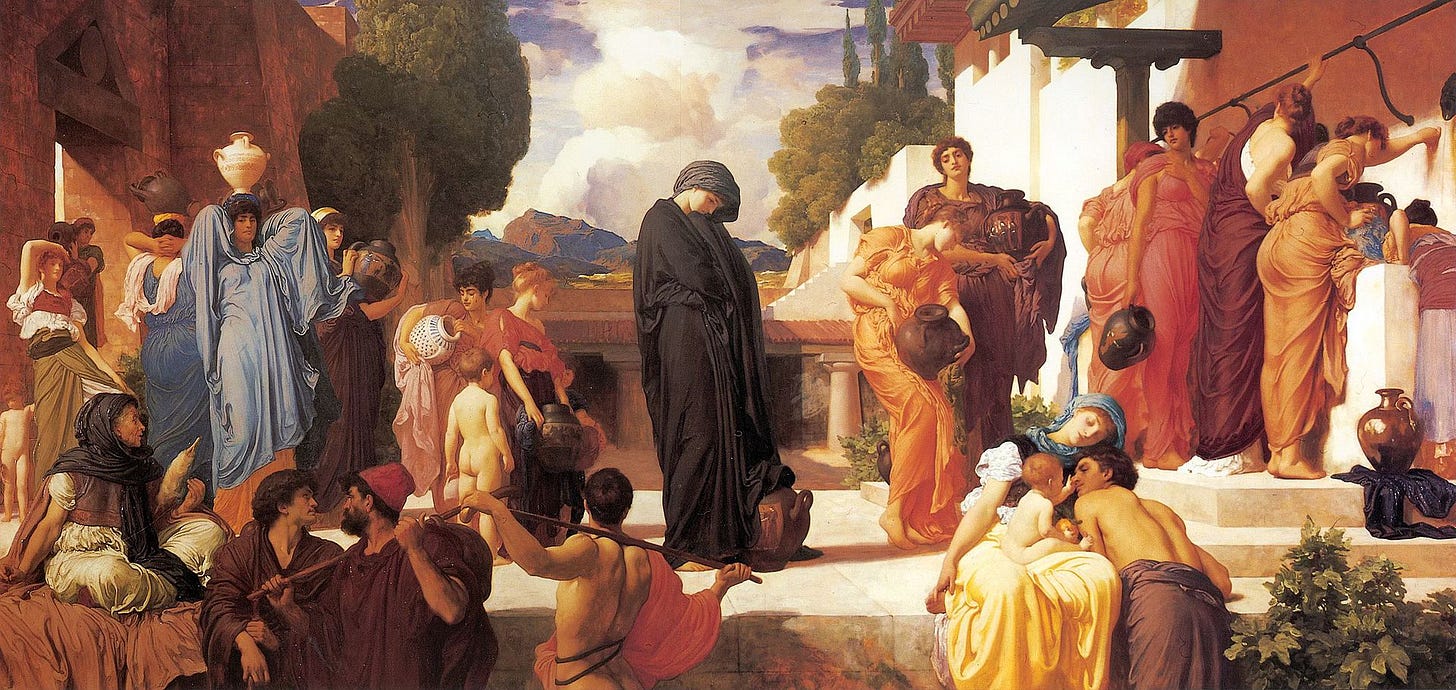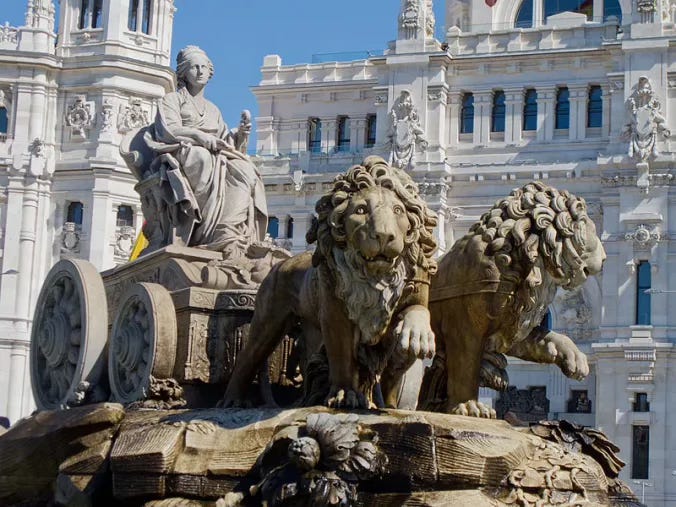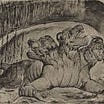The Old Priest is Dead; the Burden is Lifted: Reading Aeneid, Book III
Does piety bankrupt youth?
This is the third of a twelve-part series on Virgil’s Aeneid that I am undertaking with my dear friend, Montana Classical College. The above recording is accompanied below by a short essay that outlines the most prominent of my thoughts on the reading. Montana is publishing his reaction on his own Substack as well.
Have you had it with the Boomer race? Were you maddened by their collective insistence on grinding the whole of society to a halt during the early 2020s to compensate for their lack of spiritual preparedness for death? Do you long for a revival of youth and vitality in our world? Book III of Virgil’s Aeneid deals, in both subtlety and overtness, with precisely these matters, but in a much more ancient context. Perhaps you have pondered the merits of gerontocide. But your thoughts have been neutered by a sudden solipsistic recontextualization: you suddenly see in your mind’s eye your own loving parents and feel towards them a bond transcendent of reason that commits you to love. Here in Book III, Aeneas finds himself caught in much the same predicament.
SYPNOSIS:
Book III of the Aeneid is comprised of the second half of Aeneas’s narrative to Dido and the Carthaginian court. In it, he details the many false starts and misadventures he and his comrades have had since their departure from Troy. The first of these is in Thrace, the area northeast of the Greek mainland, where the Trojans even begin to build a new city. (The reader is reminded that although Aeneas knows he is destined to found the new Troy, he is as of yet unsure of its destined location.) It was to the ruler of these Thracian lands that, years before, King Priam had sent one of his sons, Prince Polydorus, along with a large quantity of treasure. But when this king heard that the Trojans had lost the war, he slaughtered Polydorus and stole the loot. Polydorus has evidently not even been given a proper burial, as Aeneas realizes when he hears Polydorus’s voice echoing from within the soil after he uproots some reeds. From beyond the grave, Polydorus implores Aeneas to leave the Thracian lands. Aeneas recognizes the danger and he and his people promptly depart, but not before giving Polydorus a proper burial and thus consigning his soul to rest.
Next, they sail to Delos, an island ruled by a friendly king, a long-lost friend of Aeneas’s father, Anchises. Here Aeneas prays to Apollo, from whom they receive a slightly more instructive clue: they must return to the lands of their forefathers. This could mean that they are supposed to go to Italy, whence Dardanus supposedly hailed, or, as Anchises interprets it, to Crete, from whence Teucer, another ancient Trojan, originally came. The Italian idea occurs to no one, and so Anchises’s plan is put into action. But once on Crete, a plague strikes, and many of the party succumb to it. The survivors return to Delos, where Aeneas is visited in his dreams by the household gods of Troy, who finally inform him that it is to Italy that he is destined. With this confirmation in hand, the Trojans excitedly make their way west. Their first stop is on the small islands of the Strophades, where they are attacked by Harpies, whose queen, Celaeno, delivers a very unpleasant prophecy: that although they will reach Italy, Aeneas and his men will suffer greatly before they ever fulfill their destiny of founding the new Troy. They escape with the fear of this doom in their hearts.
Next, they stop in a place called Buthrotum, in what is now the southernmost tip of Albania. Here, a Trojan pair have, by several strokes of good fortune, become king and queen of the region. These are Andromache, Hector’s widow, and Helenus, a priestly son of Priam. Both had been taken by Pyrrhus, Achilles’s son (a.k.a. Neoptolemus) as slaves; Andromache had even borne him a son (making her husband’s killer her child’s grandfather). But Pyrrhus then lusts after the ladylove of Agamemnon’s son Orestes, Menelaus and Helen’s daughter Hermione (yes, a cousinly romance). He takes Hermione as a wife, in retribution for which Orestes kills him. It is after Pyrrhus’s death that Andromache and Helenus become rulers. With oblation to Neptune, Helenus helps Aeneas to understand his future: a long journey with many obstacles still stands between Aeneas and landfall in Italy. He encourages him, once he has arrived, to stop in Cumae and consult the oracle there. He also says not to worry about Celaeno’s false prophecy. With this spiritual fortification, the crew makes sail again, but not before Andromache very sweetly gives little Ascanius a tunic or some other sort of garment that she had been weaving for her own young son, Astyanax, now dead at the hands of the marauding Greeks.
We then get something of a micro-Odyssey: Aeneas and crew land in Italy, seeing a lovely sign of four white horses, suited either to war or to agriculture. Virgil imagines Sicily or a small island of its coast to be the homeland of the Cyclops. Here they have a close encounter with Polyphemus, who has already been gouged by the Ithacan crew. One of said crew, Achaemenides, shows himself to Aeneas in a manner disturbingly reminiscent of the apparition of the deceitful Sinon in the previous book. The Trojans, either religiously committed to charitable approach to strangers or incapable of learning their lesson, trust Achaemenides and bring him aboard their ships. As they are leaving, the terrifying Cyclopses wade into the surf. Unlike Odysseus before them, who, as you may recall, decided to taunt the Cyclops on his way asea, manage to escape unharmed. They then continue carefully around the terrifying sea monsters Scylla and Charybdis (a maneuver that Odysseus’s pride prevented him from successfully doing). A smattering of other locales are mentioned, and the Book ends with Aeneas mournful description of his father’s death and burial, which takes place at Drepanum, near the modern-day Sicilian city of Marsala. This brings us up to the events of the Book I, when Juno’s storm blows Aeneas and his crew off course, and sympathetic Neptune spirits them to Carthaginian shores.
COMMENTARY:
Book III is an exercise in affirming Aeneas’s and his Trojans’ moral superiority over their Greek conquerors, particularly the figure of Ulysses. This is done primarily through the figure of Achaemenides, who staggers emaciated out of the forest and kneels on the shore in supplication of the Trojans who have made camp there. It was with similar suddenness, only one book ago, that Sinon appeared, captured by Trojan shepherds. Perhaps Achaemenides’s physical state lent credibility to his story, which is eerily similar to that of Sinon: they both say that they were viciously mistreated at the hands of Ulysses (it was even Ulysses’s idea to sacrifice Sinon to the gods “to ensure safe passage back to Hellas”!) It is not explained exactly how Achaemenides was left behind on the Cyclops’ island (he seems to be invented by Virgil, not borrowed from the Odyssey), only: “immemores socii vasto Cyclopis in antro / deseruere.” – “my friends forgot, deserted me in the vast cave of the Cyclops.” Dryden’s translation invents the explanation that Odysseus’s captive crewmembers left Achaemenides behind because they were “fearful for themselves.” This does not appear, however, to be justified by the original.
How is it possible that, his skeletal form notwithstanding, the Trojans do not have their hackles raised by this apparition? How could they ever trust a Greek again, let alone one emerging in such shady circumstances? Instead of suspicion, we hear that father Anchises beckons to the man in goodwill, and, after they flee the onrushing Cyclopses, that Achaemenides has been brought aboard! So, the comrade who was left to die by Ulysses has been saved from a woeful fate by the Trojans. The reader is to understand this conspicuously resonant scene as the Trojans’ having passed a moral test. Sinon should have broken an impious people’s devotion to the rite of xenia, hospitality or guest-friendship. The encounter with Achaemenides shows that their piety is not only intact but likely unbreakable, given the severity of the test that Sinon has posed to it: i.e. the destruction of basically all that they hold dear. The Trojans are somewhat reminiscent of Job here.
A problem is posed by this though. This is that, for all their piety as expressed to Zeus Xenios (the person of Zeus that would have been outraged by the breaking of the rites of hospitality), they are still woefully unable to read the signs of the gods, leading to a catastrophically circuitous route. It is significant in consideration of this that it is the elder Anchises who both raises his hand in welcome to Achaemenides and botches the interpretation of the missive sent by Apollo, leading the people to disaster in Crete.
We are led by this situation to the question: is piety in action conducive to divine understanding in intellectual terms? In more grounded phrasing: why does Anchises’ pious disposition not afford him the ability to correctly interpret the gods’ signs? Or is it all just a plot device? What does Virgil mean? What does the text say?
Anchises’ mistake is made all the more embarrassing by a fact that the Dryden translation glosses—when Apollo’s voice thunders down to tell Aeneas to, per Dryden, “seek that mother earth” (antiquam exquirite matrem), the god addresses his audience as “Dardanae duri”, perhaps literally “strong Dardanians”. Fagles renders it “Sons of Dardanus”. But Dryden calls them “Undaunted youths”, dispensing with the reference to the Italian forefather of the Trojans altogether. While at first this may seem to be a grave error on Dryden’s part, we may soon see how it is in fact a stroke of clever brilliance.
In the original, the reference to Italian Dardanus (an obvious direction that Aeneas and his band should proceed to Italy [one can imagine Apollo saying to himself, “how much clearer can I make it for these people?!”]) is followed in short order by Anchises’s disastrous misinterpretation—that Apollo referred not to Dardanus but to Teucer and Cybele, Troy’s Cretan ancestor and divine matron. How could he possibly have thought that, given that Apollo literally invokes Dardanus’s name?! There is but one answer: senility. Herein lies Dryden’s ingenuity: by putting the words “Undaunted youths” in the mouth of Apollo, he puts generational enmity between Anchises and Aeneas, they come to represent, respectively, the geriatric and the sprightly. It is no accident that at the end of this chapter, Anchises dies. Had it not been for Juno’s waylaying rage, their next stop would have been Dardania itself. So Anchises dies, somewhat like Moses, just before the final and culminating leg of the journey.
Although in no way literal, Dryden’s rendition here gets to the nut of this Book’s tension: that between youthful vitality and filial piety. In the original, faithfully reproduced in Fagles, Anchises’s wrongheaded response to Apollo’s unambiguous instruction is almost humorous: a satirical mockery of a bumbling old man hearkening back to a now irrelevant set of circumstances. He also refers to the story of the mother goddess Cybele coming to Troy from Crete. In so doing, he also takes on the personage of the foolish priest who invents increasingly farfetched metaphysical explanations to justify his initial, ill-conceived arguments. In both cases, it is clear that Virgil intends for us to read him as a kind of demented Fool.
With this we may return to the instigating question on the distinction between action and knowledge in the context of piety. Anchises is too old to be able to understand the signs, he is blinded by his nostalgia, he was altogether right to have insisted in Book Two that Aeneas leave him behind to be cremated alive in the conflagration that consumed the Trojan heights. But Aeneas, in his own, younger version of piety, insisted on bringing him along, ostensibly trading his father for his wife. Virgil gives us a well-wrought glimpse of just this kind of nostalgia of Anchises’s in the greeting he shares with Anius, the king of the sacred isle of Delos, where the Apollonian prophecy is handed down. Dryden renders the moment with loveliness:
Anius, the priest and king, with laurel crown'd,
His hoary locks with purple fillets bound,
Who saw my sire the Delian shore ascend,
Came forth with eager haste to meet his friend;
Invites him to his palace; and, in sign
Of ancient love, their plighted hands they join.
It is a depiction of two retired old men crossing paths on the golf course! While tender and pleasing in itself, it has no place in the challenging project that Aeneas has before him. Thus we see that while every father’s son may commend from his heart the honorable actions of Aeneas in rescuing Anchises and giving him perhaps a better burial than he would have had (perhaps Montana and I will make pilgrimage to Marsala, Anchises’s presence on the Aeneas’s odyssey is not of any practical use. In fact, he twice over imperils the mission, risking the wrath of the Fates via their enforcer, Jupiter. First, by stupidly sending the ships to Crete, when it was obvious that Apollo intended Dardanian Italy, and second, by hailing and welcoming what, as far as any of his son’s comrades knew, was yet another Greek bearing gifts. These mishaps were not made out of malice, of course, but rather were the results of mismatches between the man and the moment. Owing to his advanced age, Anchises simply could not have known, as we say online, “what time it is.” His skill set, such as it was, was attuned to an altogether different age and context. It is upon release from his influence that his son’s project final begins to prosper towards its divinely intended end. Does this sound familiar?!







